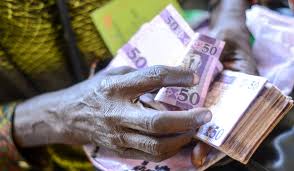By William Madouk
Bank of South Sudan (BoSS) has announced it will auction ten billion South Sudanese pounds to commercial banks for the first time.
All along, the central Bank of South Sudan has been on a dollar-auctioning spree, injecting 13 million dollars on a weekly basis to tame the market, in an attempt to stabilize the volatile exchange rate against South Sudanese pounds.
In a tender invitation, No.1 Citizen Daily Newspaper has seen, Grace Araba, the chairperson of the Term Deposit Facility Committee, notified banks to submit their bids at 9Am, on Monday.
“The Bank of South Sudan intends to auction the sum of SSP 10,000,000,000 to eligible banks through the Term Deposit Facility Operation that earns interest over the duration of the tenor,” read the statement.
The auction will be held on Wednesday, May 31, 2023, and settlement (including an upfront payment of the accrued interest) shall be completed on the same day, the notice on BoSS’ website, indicated.
According to the chairperson of the Term Deposit Facility Committee, the auction opens at 10:15 a.m. and close at 11 a.m.
The 14-day mood that will start on June 11 will be allocated SSP 5 billion; the 28-day tenor on June 25 will be allocated SSP 3 billion; and the 84-day tenor on August 28 will be allocated SSP 2 billion.
South Sudanese Pounds deprecated to a record lowest value in the past weeks. The exchange rate per one dollar is now at SSP 1,050 to 1,060 in the parallel market, while the official bank rate is at SSP 969, 4327 over the weekend.
The Executive Director of the Institute for Social Policy and Research, Mr. James Boboya had urged the government to set up proper mechanisms to control foreign exchange and currency flow in the market.
According to Boboya, monetary devaluation and the widespread use of hard currency makes citizens to consider the US dollar a commodity.
He attributed flourishing black market US dollar trade to the policies of the Central Bank of South Sudan.
Mr. Boboya said the black market survives because of some fellows at the Central Bank who have framed positive policies to protect the illicit market.
Meanwhile, Central Equatoria State Chamber of Commerce Chairperson, Mr. Robert Pitia, one of those concerned about the economic crisis, blamed the situation on foreign and national economic policies.
Mr. Pitia argued that government could control internal factors such as multiple taxes at different levels of government; national, state, county and city council revenue authorities.
He also listed numerous other institutions that levy taxes on traders, which eventually prompt an increase in commodity prices.
On Friday, the ministry of finance and planning said the country has enough reserves to tackle the runaway exchange rate.
“We have reached a concrete solution to avail dollars into the market to address the high inflation,” minister Dier Tong Ngor said after meeting with Salva Kiir.
He added that they would soon inject enough dollars into the market to counterbalance the high demand for hard currency and lower consumer prices.
On his part, the governor of the Bank of South Sudan, Johnny Ohisa, stated that the bank would fund the importation of basic food commodities to South Sudan’s markets from Uganda.
The government also highlighted that it had reached an agreement with Uganda to supply basic food commodities to South Sudan’s markets.




